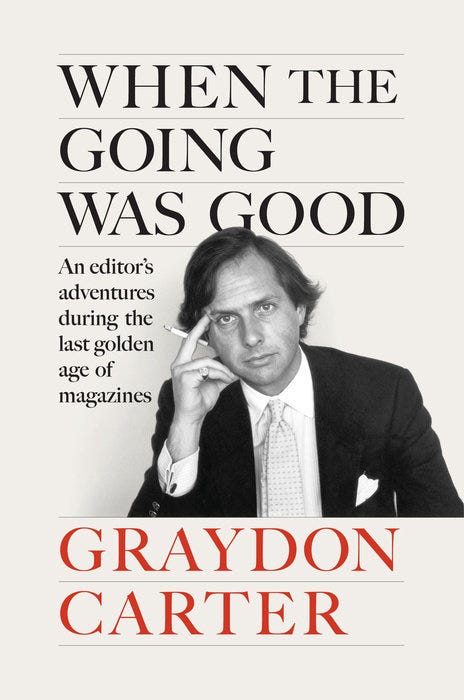6 Questions with Graydon Carter
The Air Mail founder on why Si Newhouse could've run a film studio, whether he fears retaliation from Trump, and what he misses the most about Condé Nast
It doesn’t matter how many times Graydon Carter appears on a podcast or sits down for a Q&A. Whenever I see his name, I click. That’s because the former Vanity Fair editor is as honest and insightful as any power player.
At 75, Carter has shown no signs of moving to Palm Beach and retiring (if anything, he’d prefer the South of France). Instead, he is charging ahead with Air Mail, the weekend newsletter packed with delicious features. His DNA is across every issue, which makes it a must-read. My first-ever byline appeared in his outlet, where I wrote about the discount real estate buyers can achieve by purchasing canceled people’s homes.
He is on a busy promotional tour right now for his excellent new book, When the Going Was Good, and I was fortunate enough to snag him for my first-ever Substack post.
There was the car and driver. The interest-free loans. The reimbursable dinner parties. What’s the Condé Nast executive perk you miss the most?
I’ll confess that those aspects of the job were wonderful and appreciated. But the thing I miss most is having lunch with Si1. We gossiped and laughed a lot during them. And I learned so much from him. Honestly, I miss him just about every day.
What can today’s media moguls learn from Si Newhouse?
I think to be truly successful running any aspect of the media business, you must love what you make. Si had both Condé Nast and Random House in his domain, and among his great loves were magazines and books. He also had a passion for, and a wide interest in film. I think he could have handily run a studio as well.
You bought Waverly Inn and the Monkey Bar and made them into some of the buzziest restaurants in New York. You still own Waverly Inn today. Are there similarities between managing restaurants and magazines?
I’m a co-owner of the Waverly Inn. My partners, unlike me, actually know what they’re doing. But yes, the skills required for operating a successful restaurant or a successful magazine, are not dissimilar. Chefs search markets for the best ingredients and then assemble them into dishes that will please their diners. Magazine editors prowl their areas of interest, then work with their writers and photographers to produce stories that will please their readers. At the end of the day, chefs and editors should understand that we’re all in the service industry. And take pride in that.
As someone who has had the pleasure of writing for Air Mail, one of the best parts about working with your outlet is the editing process. There are terrific editors, copy editors, fact-checkers. But these are layers of journalism decimated by cuts. Why is editing so important to you?
First of all, editing is easier than writing. Writers build the furniture, so to speak. Editors sand it and apply the paint or varnish and place it on the showroom floor. I do believe that in this era of willfully untruthful news, that the old layers of publishing—editors, copy editors, and fact-checkers—are vital. Costly, but vital. It’s what separates us from wolves.
You’re quite outspoken against our president. Do you ever worry Trump is going to retaliate against you?
Increasingly, every day.
Why not move to Palm Beach and retire? What keeps you going?
I could never fully leave New York. And Florida is just not my thing. Nor is golf. As for retirement, unless you were involved in a job that required physical exertion—in which case I think it’s important to properly retire when you can—I think the opportunity to continue working at something you love, is a gift. A job that requires you to get up in the morning is a chore some days. But overall, it’s one of life’s great blessings.
Si Newhouse, the late Conde Nast Publications chair and Carter’s boss at VF.



